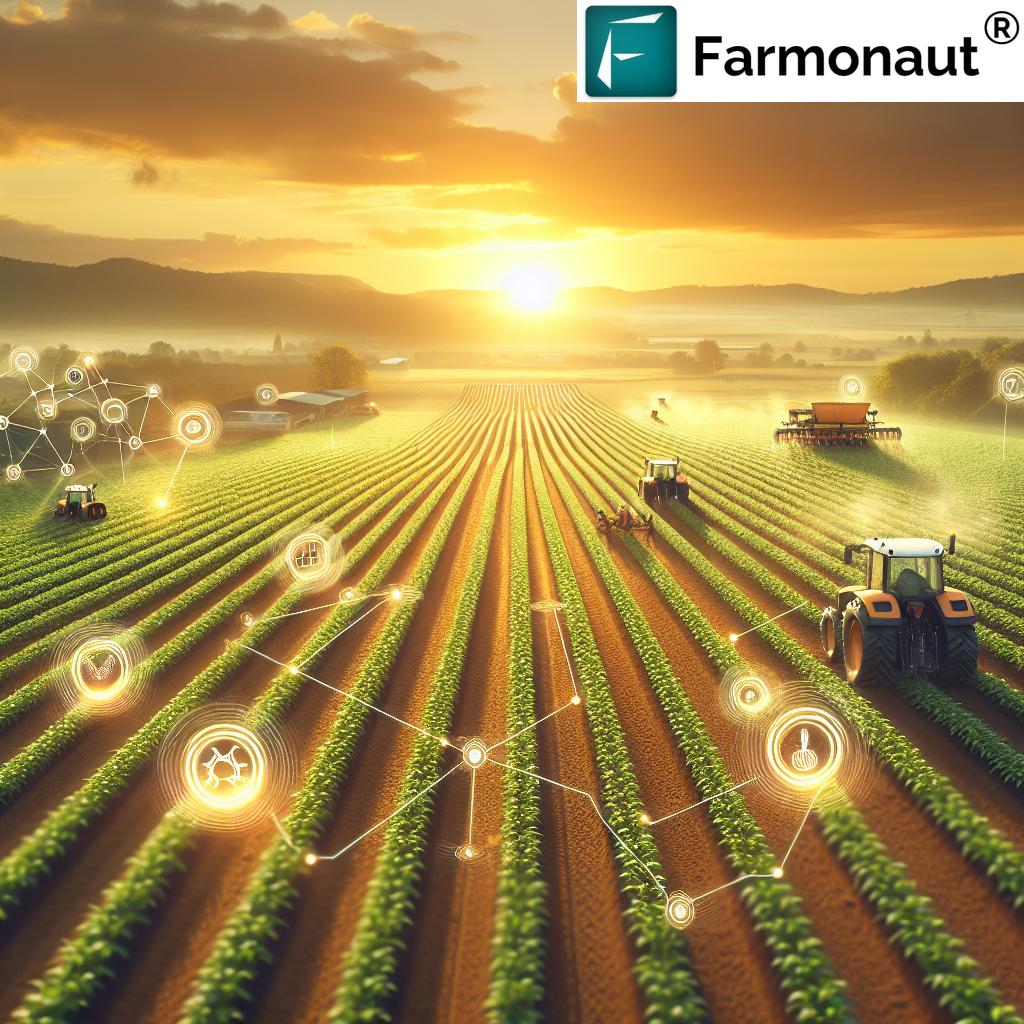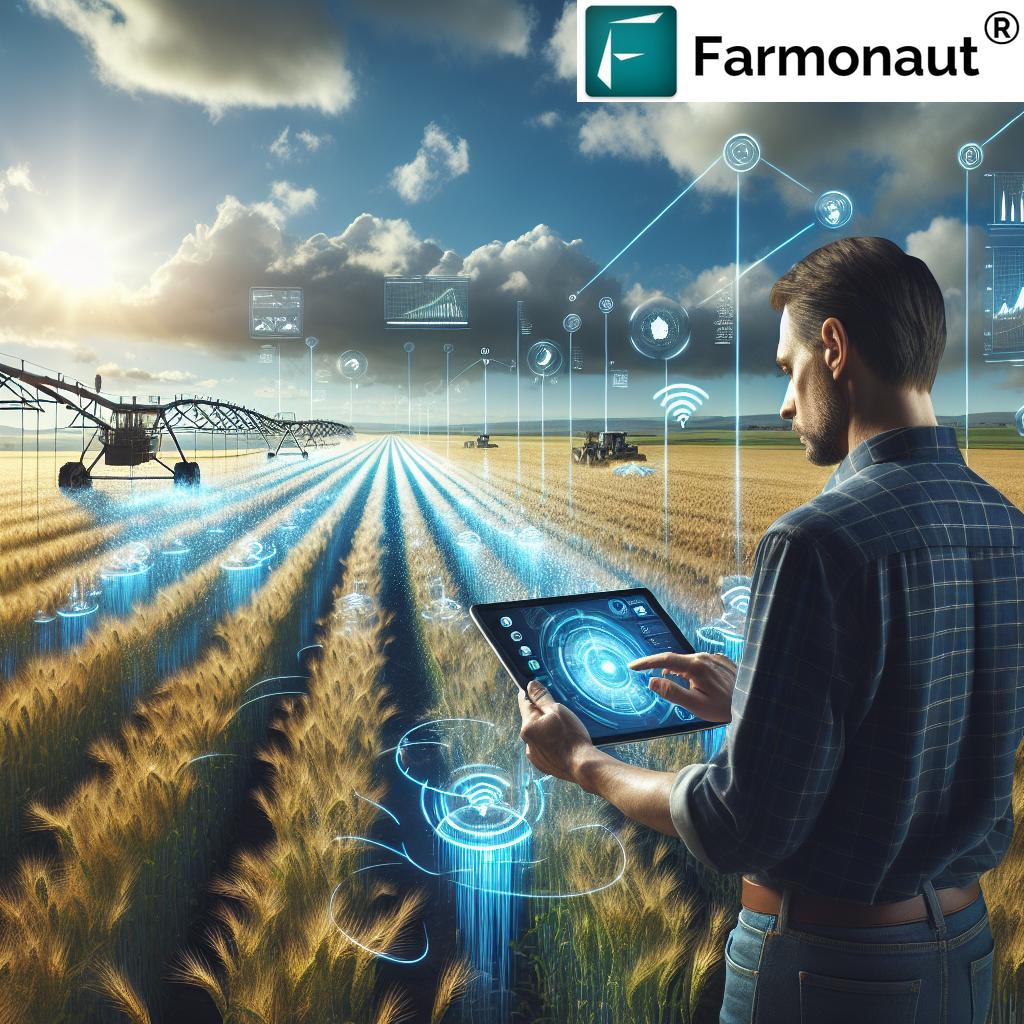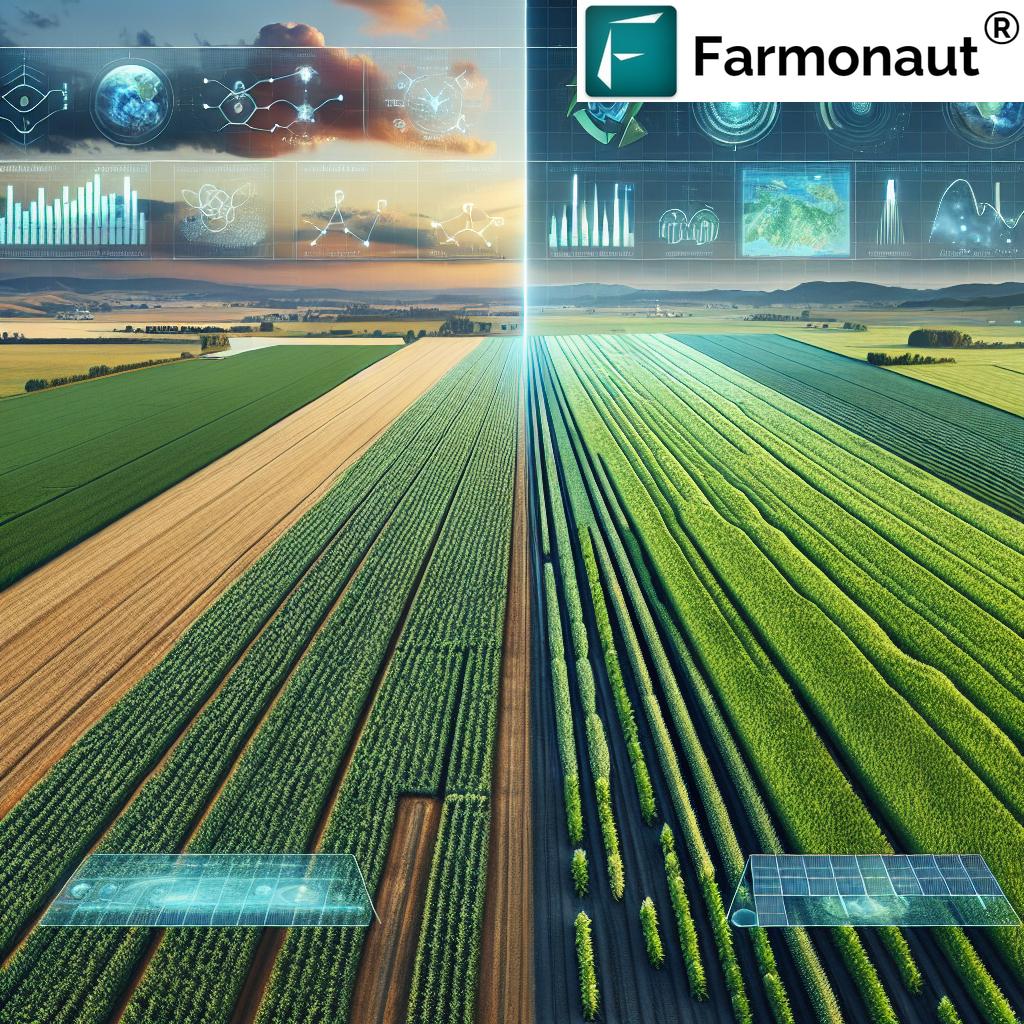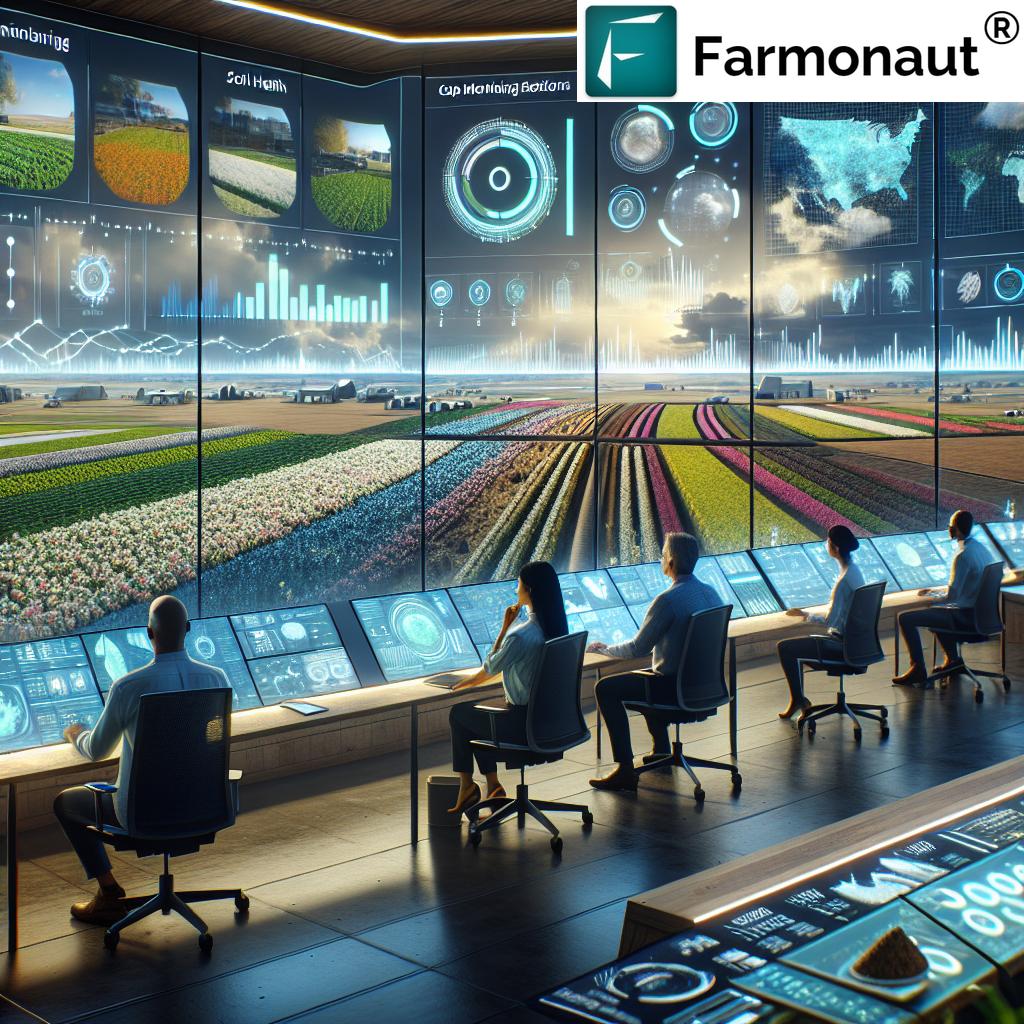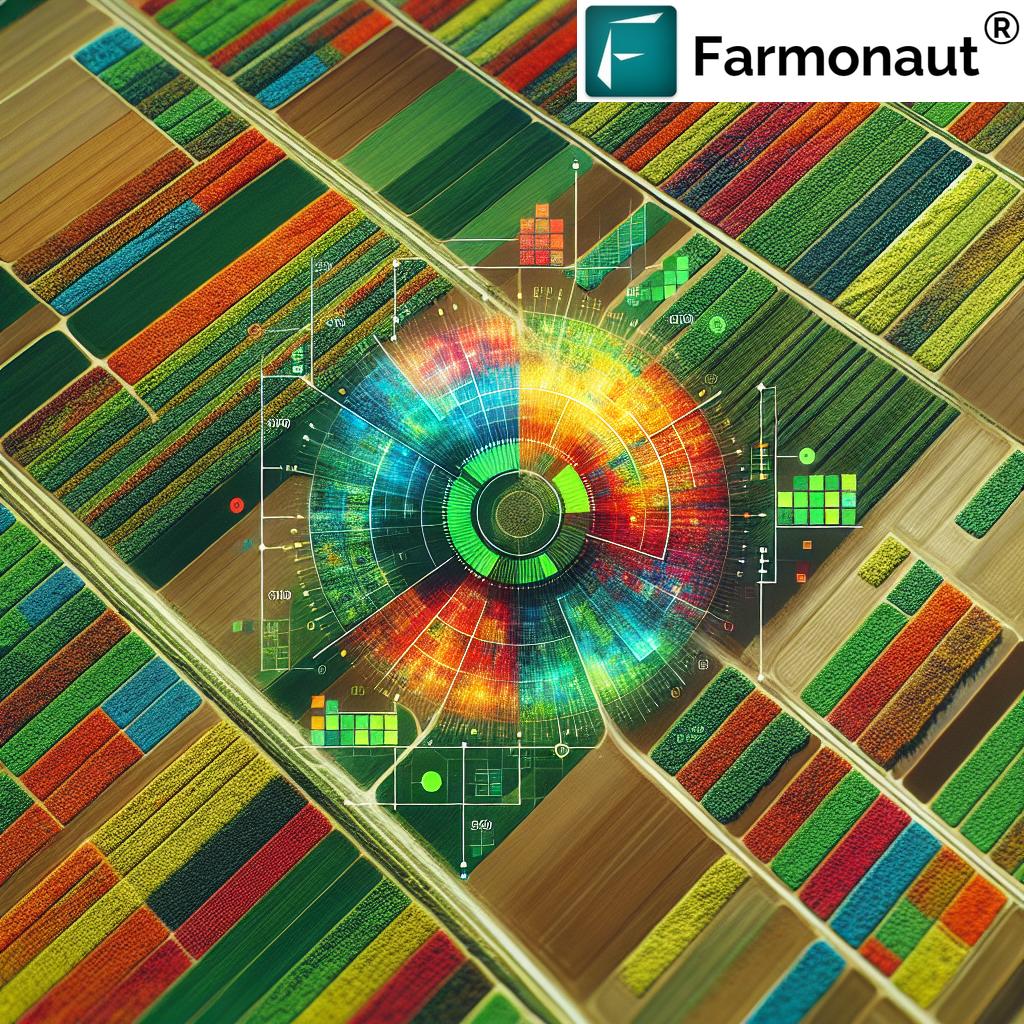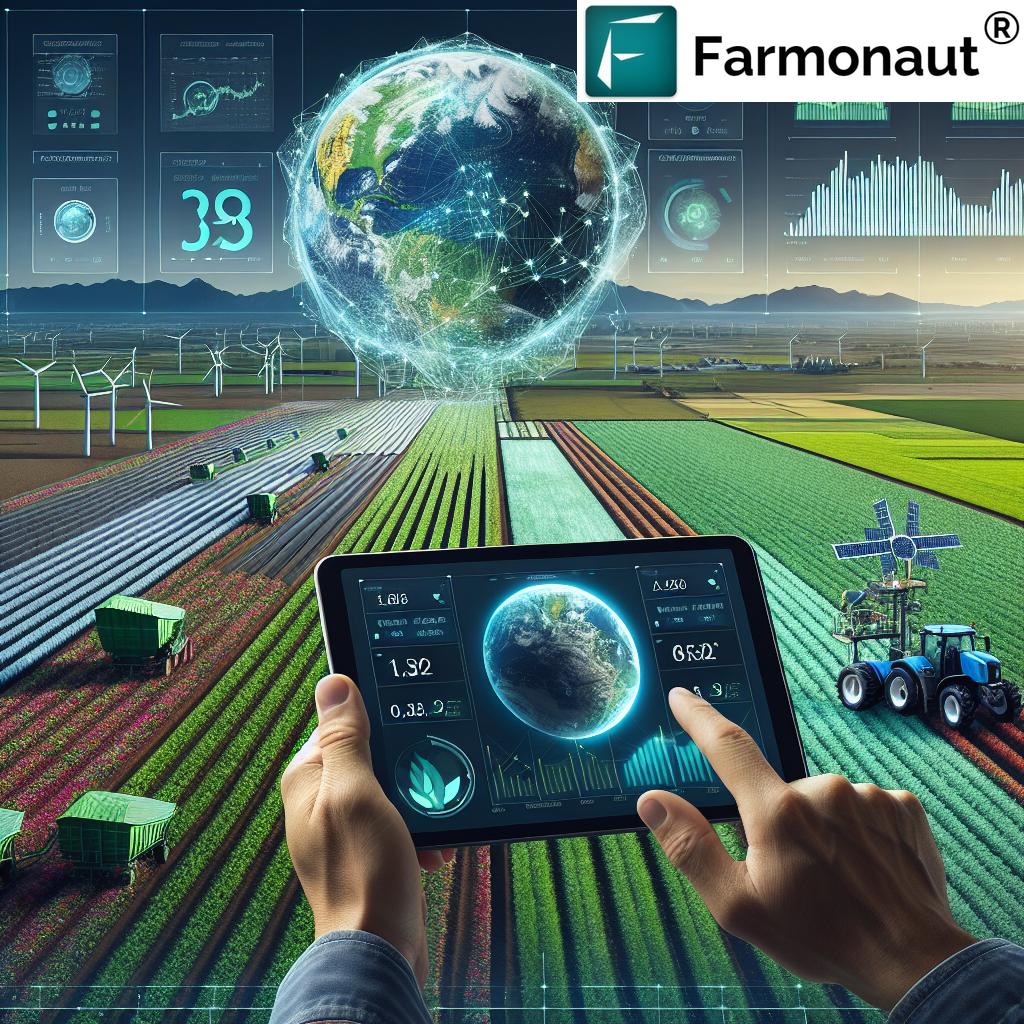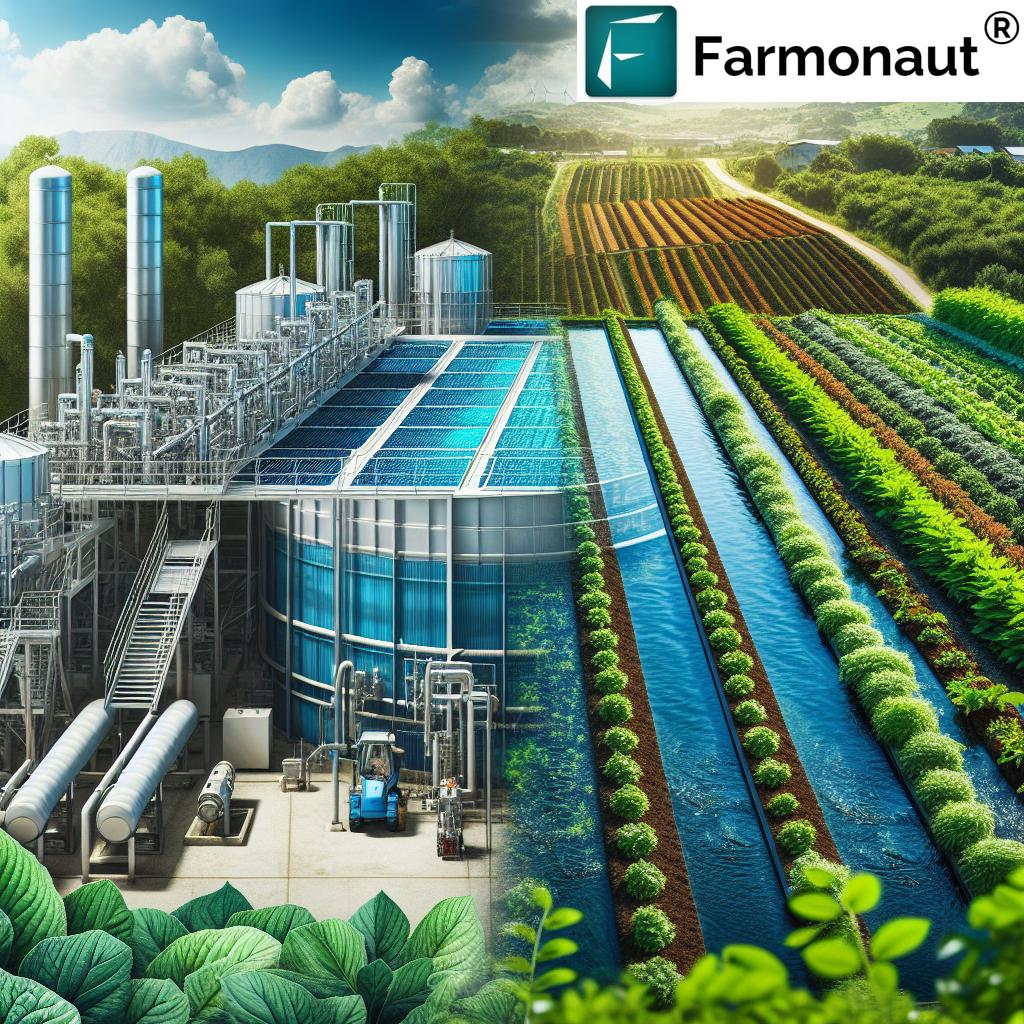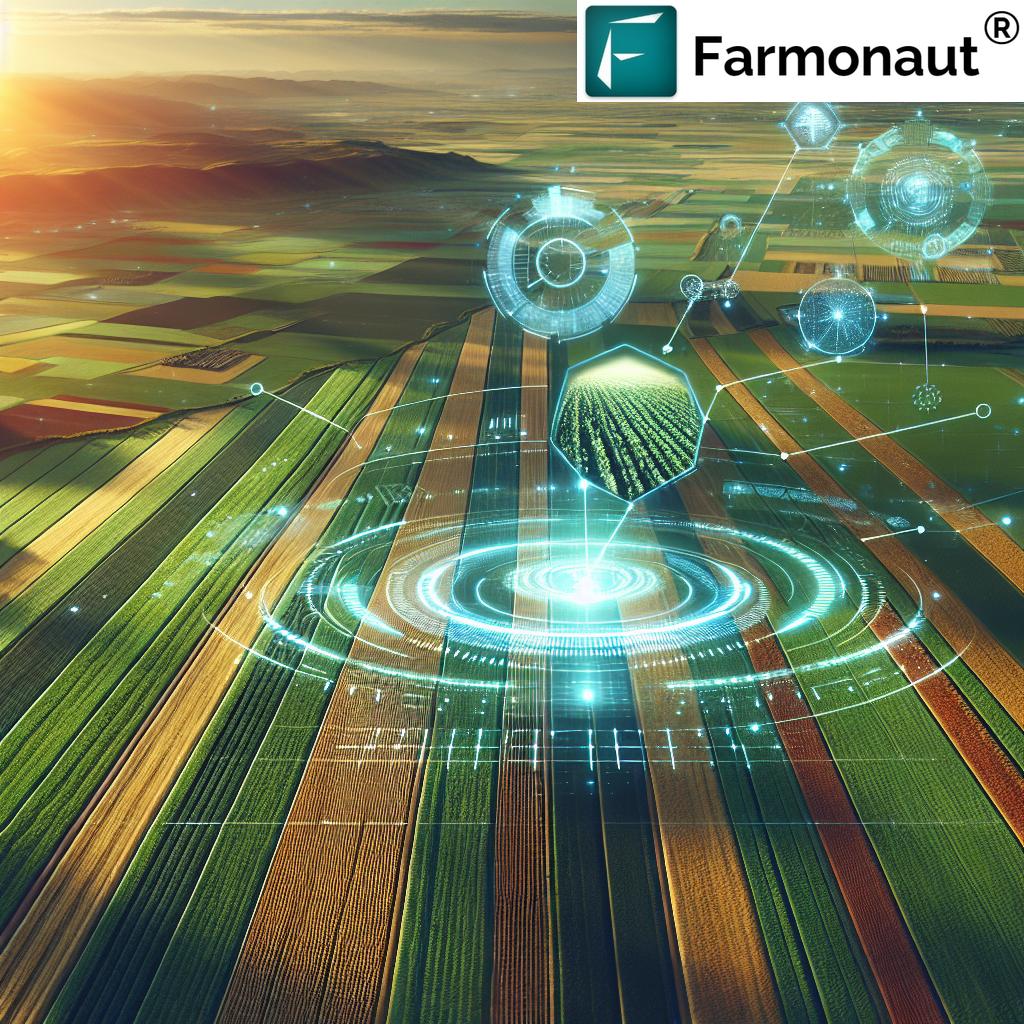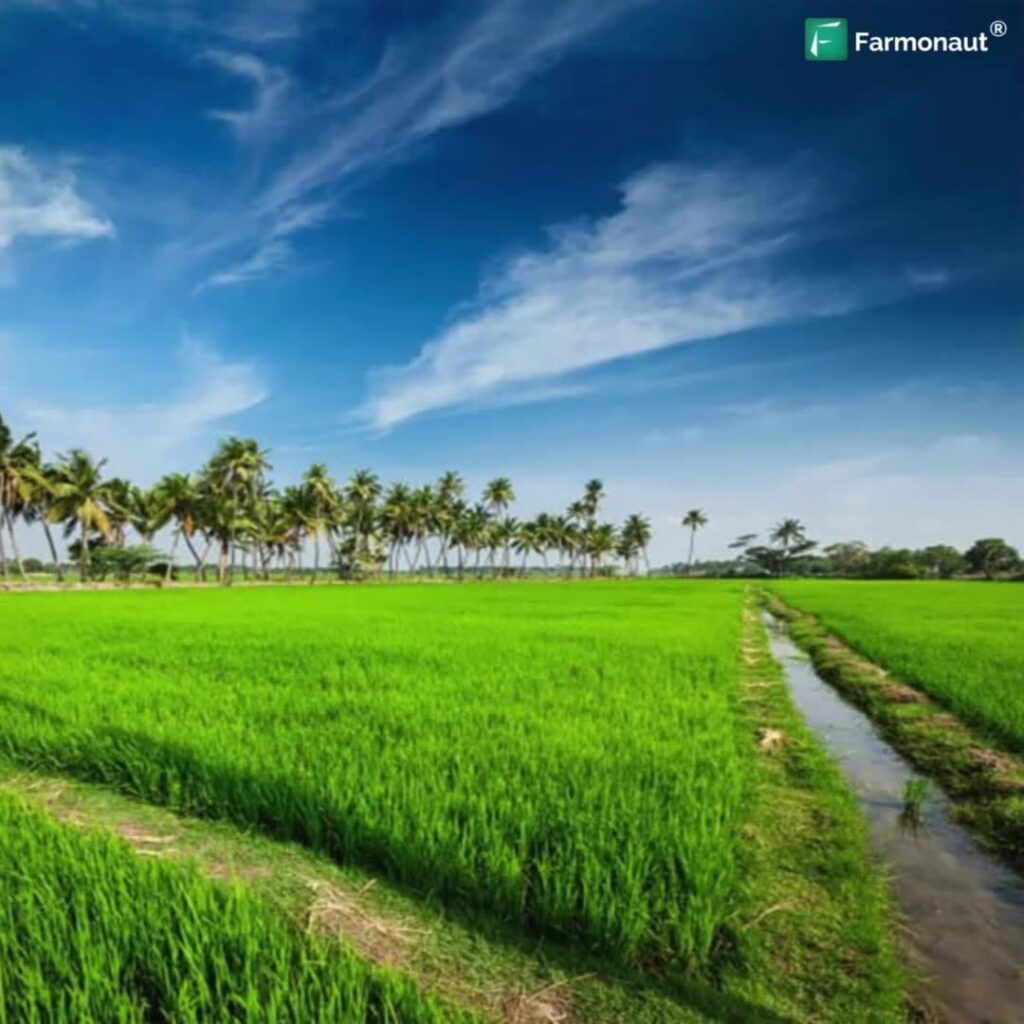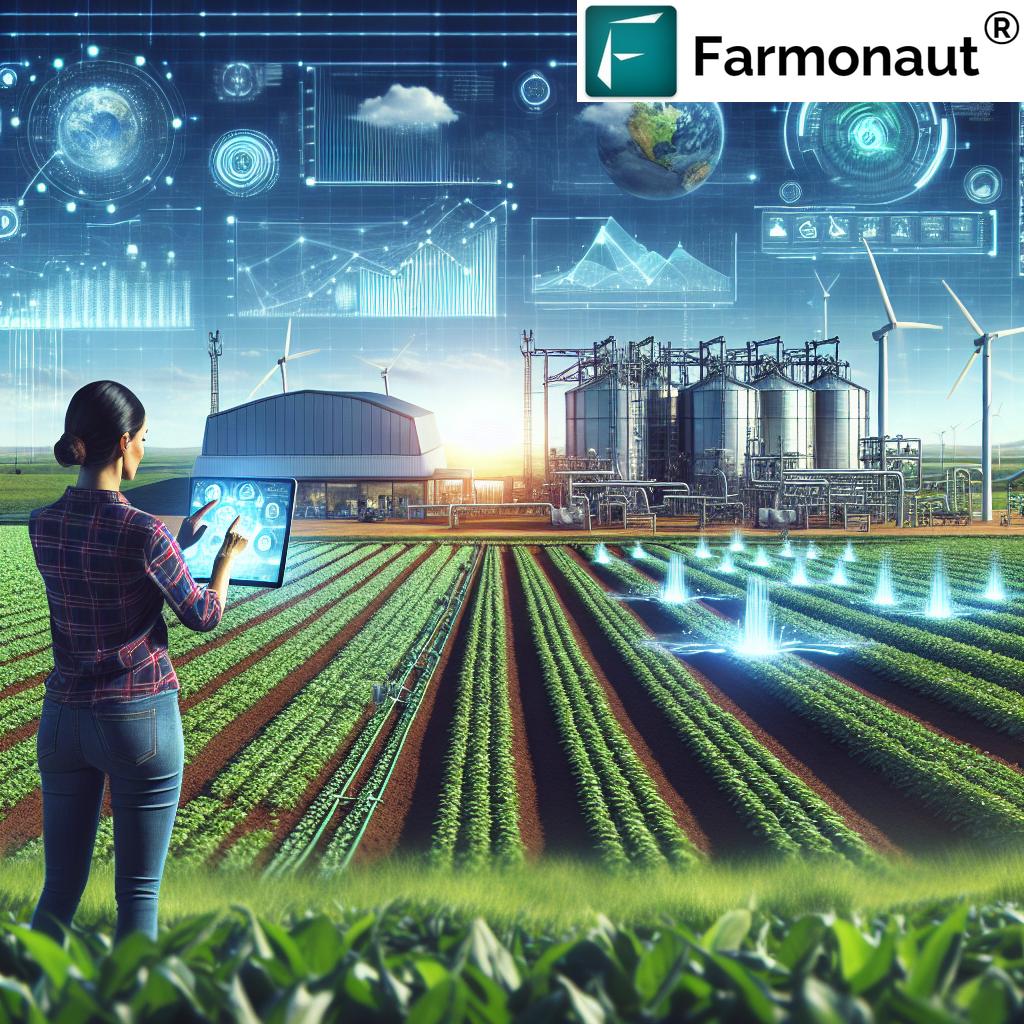Revolutionizing Agriculture: How Farmonaut’s Smart Farming Solutions Optimize Crop Yields and Boost Sustainability
“Farmonaut’s smart farming solutions have contributed to a 15% increase in crop yields for early adopters.”
In the ever-evolving landscape of agriculture, we find ourselves at the forefront of a technological revolution that promises to transform the way we cultivate crops and manage our farms. As we delve into the world of precision agriculture and smart farming solutions, it’s crucial to understand how these innovations are reshaping the industry and driving sustainable practices. In this comprehensive market analysis, we’ll explore the latest agricultural technology innovations and examine how companies like Farmonaut are leading the charge in optimizing crop yields and promoting sustainability.
The Rise of Precision Farming: A Market Overview
The global agricultural market is experiencing a significant shift towards precision farming techniques, driven by the need for increased productivity, resource efficiency, and sustainability. As we analyze current market trends, it’s evident that the adoption of smart agriculture solutions is on the rise, with the precision farming market expected to reach new highs in the coming years.
Key factors influencing this market growth include:
- Increasing demand for food production to meet global population growth
- Rising awareness of sustainable farming practices
- Advancements in satellite technology and remote sensing capabilities
- Growing investment in agtech startups and digital agriculture platforms
As we examine these trends, it’s clear that companies offering innovative farm management software and data-driven solutions are poised to capture a significant share of this expanding market.
Farmonaut: Pioneering Smart Farming Solutions
At the forefront of this agricultural revolution stands Farmonaut, a company that has made it its mission to democratize access to precision agriculture. By leveraging cutting-edge technologies such as satellite imagery, artificial intelligence, and blockchain, Farmonaut is transforming the way farmers approach crop management and resource allocation.
Key Technologies Driving Farmonaut’s Innovation:
- Satellite-Based Crop Health Monitoring
- Jeevn AI Advisory System
- Blockchain-Based Product Traceability
- Fleet and Resource Management Tools
- Carbon Footprinting Solutions
These technologies work in tandem to provide farmers with real-time insights, enabling them to make data-driven decisions that optimize crop yields and promote sustainable farming practices.
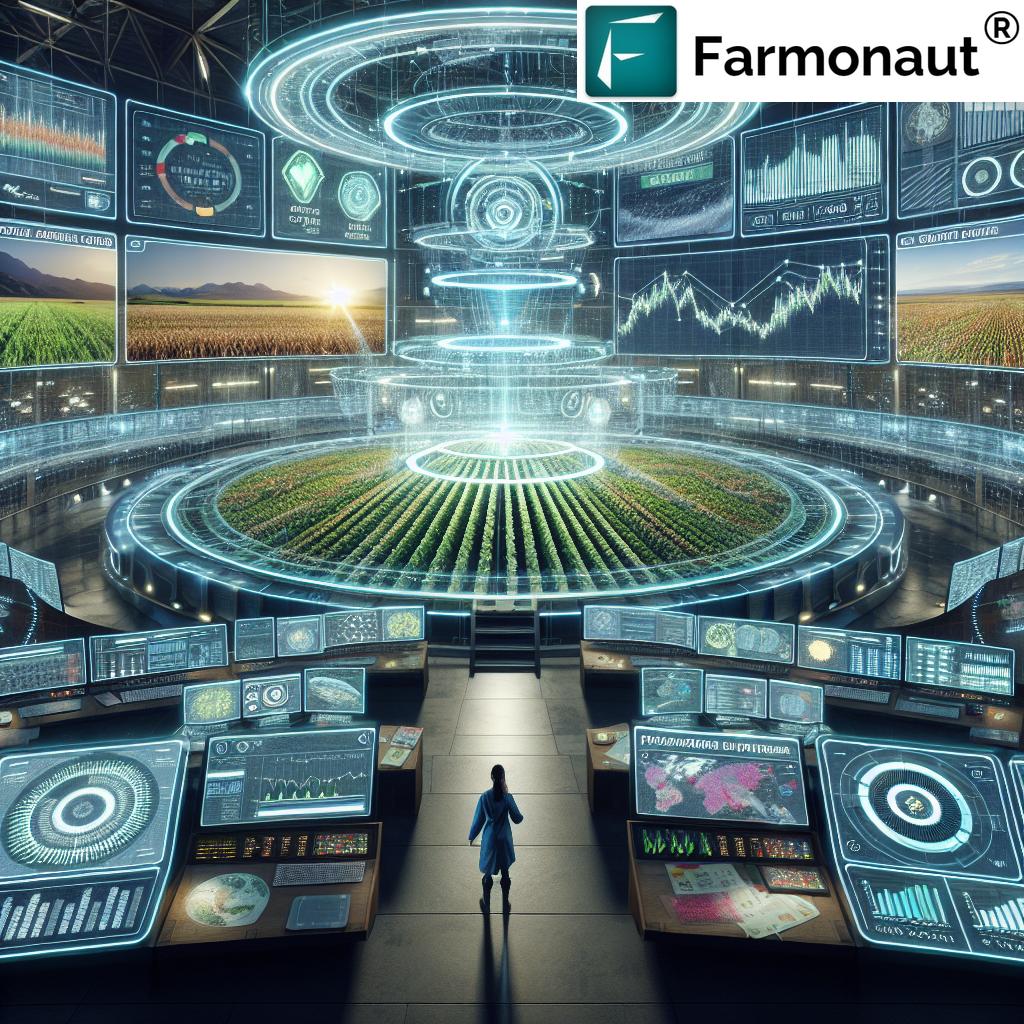
The Power of Agricultural Data Analytics
One of the cornerstones of Farmonaut’s approach is the utilization of advanced agricultural data analytics. By harnessing the power of big data and machine learning algorithms, Farmonaut provides farmers with actionable insights that can significantly impact their operations.
Benefits of Data-Driven Agriculture:
- Improved crop yield predictions
- Optimized resource allocation
- Early detection of pest and disease outbreaks
- Enhanced weather forecasting for better planning
- Reduced environmental impact through precision application of inputs
These data-driven insights not only help farmers maximize their yields but also contribute to more sustainable farming practices by minimizing waste and reducing the overuse of resources.
Remote Sensing: The Eyes in the Sky
Remote sensing technology plays a crucial role in Farmonaut’s suite of smart farming solutions. By utilizing multispectral satellite imagery, the platform provides farmers with a bird’s-eye view of their fields, offering valuable information on crop health, soil moisture levels, and other critical metrics.
Applications of Remote Sensing in Agriculture:
- Vegetation health monitoring through NDVI analysis
- Soil moisture mapping for optimized irrigation
- Crop stress detection for early intervention
- Yield estimation and harvest planning
- Land use classification and crop type identification
These remote sensing capabilities enable farmers to identify problem areas quickly and take targeted action, leading to more efficient use of resources and improved overall farm performance.
The AI Revolution in Agriculture
Artificial intelligence is revolutionizing the agricultural sector, and Farmonaut’s Jeevn AI Advisory System is at the forefront of this transformation. This advanced AI-driven tool provides personalized farm advisory services, delivering real-time insights and expert crop management strategies to farmers.
Key Features of Jeevn AI:
- Customized crop management recommendations
- Real-time weather forecasting and analysis
- Pest and disease prediction models
- Irrigation scheduling optimization
- Fertilizer application recommendations
By leveraging AI, Farmonaut empowers farmers to make informed decisions that can significantly improve farm productivity and efficiency.
Blockchain: Ensuring Transparency and Traceability
In an era where consumers are increasingly concerned about the origin and quality of their food, Farmonaut’s blockchain-based traceability solutions offer a robust answer to these demands. This innovative technology ensures transparency throughout the agricultural supply chain, from farm to table.
Advantages of Blockchain in Agriculture:
- Enhanced food safety and quality assurance
- Improved supply chain efficiency
- Reduced fraud and counterfeiting
- Increased consumer trust and brand loyalty
- Simplified compliance with regulatory requirements
By implementing blockchain technology, Farmonaut is not only addressing consumer concerns but also helping agribusinesses build stronger, more transparent relationships with their customers.
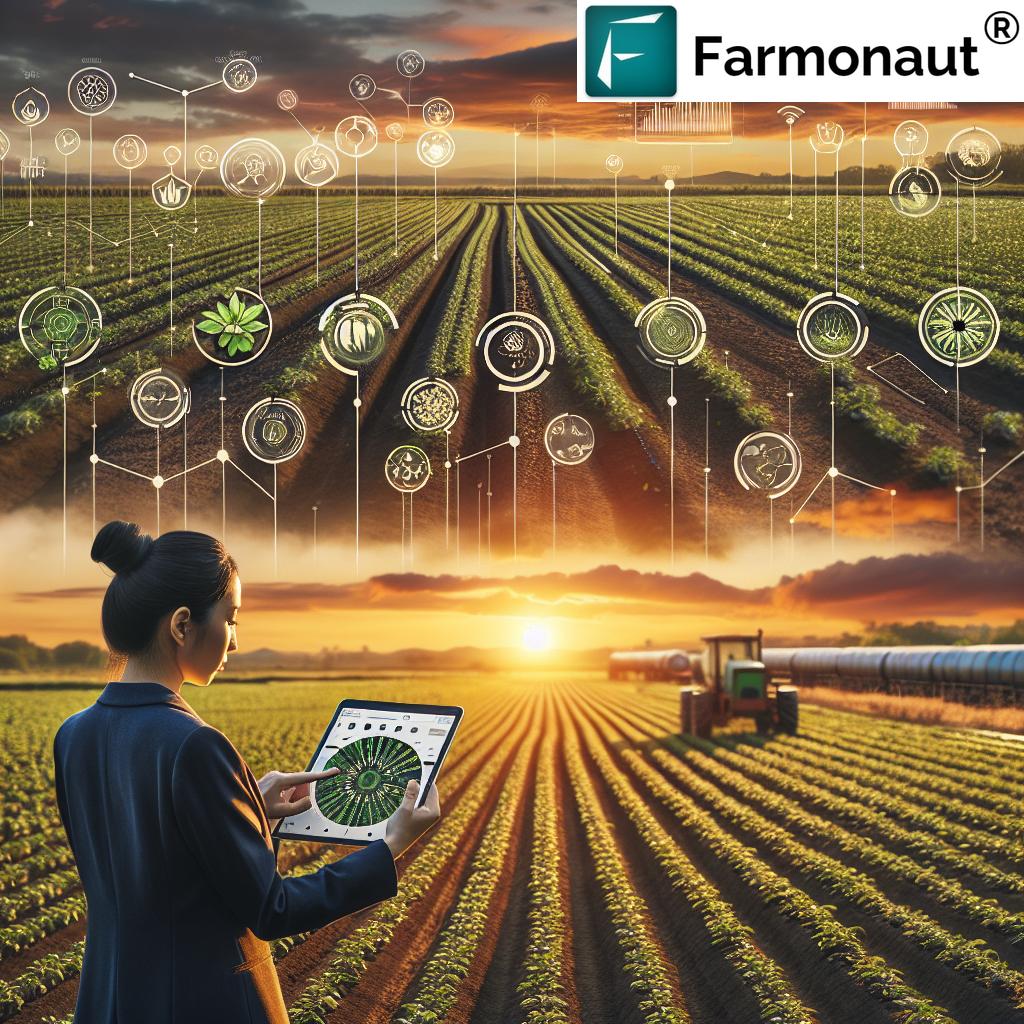
Sustainable Farming Practices: The Future of Agriculture
As the global community becomes increasingly aware of the environmental impact of traditional farming methods, the demand for sustainable agriculture solutions is on the rise. Farmonaut’s smart farming platform addresses this need by promoting practices that reduce resource consumption and minimize environmental footprint.
“Agricultural data analytics powered by Farmonaut has helped reduce water usage by up to 30% in precision farming applications.”
Sustainable Farming Initiatives Supported by Farmonaut:
- Precision irrigation to conserve water resources
- Targeted application of fertilizers and pesticides
- Carbon footprint tracking and reduction strategies
- Soil health monitoring and conservation practices
- Biodiversity preservation through data-driven land management
By embracing these sustainable practices, farmers can not only reduce their environmental impact but also improve their long-term profitability and resilience.
Digital Agriculture Trends: Shaping the Future of Farming
As we look to the future of agriculture, several key digital trends are emerging that promise to further transform the industry. Farmonaut is at the forefront of these developments, continuously innovating to meet the evolving needs of farmers and agribusinesses.
Emerging Digital Agriculture Trends:
- Internet of Things (IoT) integration for real-time monitoring
- Edge computing for faster data processing in the field
- 5G technology enabling more robust data transmission
- Advanced robotics and automation in farming operations
- Predictive analytics for proactive farm management
These trends are shaping the future of farming, and Farmonaut is well-positioned to leverage these technologies to enhance its smart farming solutions further.
Market Performance and Financial Analysis
As investors and industry analysts look to the agtech sector for opportunities, it’s essential to consider the market performance and financial outlook of companies like Farmonaut. While specific financial data for privately held companies may not be publicly available, we can analyze broader market trends and indicators to gauge the potential of smart farming solutions.
Key Market Indicators:
- Growing investment in agtech startups
- Increasing adoption rates of precision agriculture technologies
- Rising commodity prices driving demand for yield optimization solutions
- Government initiatives supporting sustainable farming practices
- Expansion of digital agriculture in emerging markets
These indicators suggest a positive outlook for companies operating in the smart farming space, with potential for significant growth and market expansion in the coming years.
Navigating Market Volatility in Agriculture
The agricultural sector is known for its volatility, influenced by factors such as weather patterns, global trade dynamics, and changing consumer preferences. Farmonaut’s data-driven approach provides farmers and agribusinesses with tools to better navigate these uncertainties and mitigate risks.
Strategies for Managing Agricultural Market Volatility:
- Diversification of crop portfolios based on market analysis
- Use of futures and options for price risk management
- Implementation of AI-driven forecasting models
- Adoption of flexible farming practices to adapt to market changes
- Leveraging real-time market data for informed decision-making
By utilizing Farmonaut’s smart farming solutions, agricultural stakeholders can better position themselves to withstand market fluctuations and capitalize on emerging opportunities.
Maximizing Farm Income Through Technology
One of the primary goals of adopting smart farming solutions is to maximize farm income. Farmonaut’s suite of tools is designed to help farmers achieve this objective by optimizing every aspect of their operations.
Ways Farmonaut Helps Maximize Farm Income:
- Increasing crop yields through precision management
- Reducing input costs with targeted resource application
- Minimizing crop losses through early detection of issues
- Improving product quality for higher market prices
- Enhancing decision-making with real-time market insights
By leveraging these technologies, farmers can significantly improve their bottom line while also contributing to more sustainable agricultural practices.
The Role of Commodities in Smart Agriculture
Understanding commodity markets is crucial for farmers and agribusinesses looking to optimize their operations. Farmonaut’s platform integrates market data and analysis to help users make informed decisions about crop selection, timing of sales, and resource allocation.
Key Commodities Impacted by Smart Farming:
- Grains (wheat, corn, soybeans)
- Cotton and other fibers
- Fruits and vegetables
- Oil crops
- Specialty crops
By providing insights into commodity trends and price forecasts, Farmonaut enables farmers to align their production strategies with market demands, potentially increasing their profitability.
Portfolio Management for Agricultural Investors
For investors interested in the agricultural sector, effective portfolio management is essential. Farmonaut’s data and analytics can provide valuable insights for those looking to build or optimize their agricultural investment portfolios.
Considerations for Agricultural Portfolio Management:
- Diversification across various crop types and regions
- Balancing traditional farming investments with agtech opportunities
- Incorporating sustainable agriculture initiatives
- Monitoring global agricultural trends and trade patterns
- Assessing the impact of climate change on long-term agricultural investments
By leveraging Farmonaut’s comprehensive market analysis and forecasting tools, investors can make more informed decisions about their agricultural portfolios.
The Impact of Smart Farming on Global Food Security
As the world population continues to grow, ensuring global food security becomes increasingly critical. Smart farming solutions like those offered by Farmonaut play a vital role in addressing this challenge by improving agricultural productivity and sustainability.
Ways Smart Farming Contributes to Food Security:
- Increasing crop yields in existing agricultural lands
- Reducing food waste through improved supply chain management
- Enhancing resilience to climate change and extreme weather events
- Promoting sustainable use of natural resources
- Enabling smallholder farmers to access advanced agricultural technologies
By democratizing access to precision agriculture tools, Farmonaut is contributing to the global effort to ensure food security for future generations.
Comparison: Traditional Farming vs. Farmonaut’s Smart Farming Solutions
| Farming Aspect | Traditional Farming Approach | Farmonaut’s Smart Farming Solution | Benefits of Farmonaut’s Approach |
|---|---|---|---|
| Crop Monitoring | Manual field inspections | Satellite-based remote sensing | Real-time data, 20% more efficient crop management |
| Resource Management | Uniform application of inputs | Precision application based on AI analysis | Up to 30% reduction in water and fertilizer usage |
| Yield Prediction | Historical data and experience | AI-powered predictive analytics | 15% more accurate yield forecasts |
| Pest Control | Reactive treatment after visual signs | Early detection through multispectral imaging | 25% reduction in crop losses due to pests |
| Weather Monitoring | Local weather reports | Hyperlocal AI-driven weather forecasts | 40% improvement in weather-related decision making |
The Future of Farmonaut and Smart Agriculture
As we look to the future, the potential for further innovation in smart agriculture is immense. Farmonaut is well-positioned to continue leading the charge, with ongoing research and development efforts focused on enhancing its existing technologies and exploring new frontiers in agricultural science.
Potential Future Developments:
- Integration of advanced drone technology for even more precise field mapping
- Expansion of AI capabilities to include more complex crop management scenarios
- Development of predictive models for emerging crop diseases and pests
- Enhanced integration with farm machinery for fully automated precision agriculture
- Exploration of vertical farming and urban agriculture solutions
These potential advancements could further revolutionize the agricultural sector, driving even greater efficiencies and sustainability in food production.
Conclusion: Embracing the Smart Farming Revolution
As we’ve explored throughout this analysis, the agricultural sector is undergoing a profound transformation driven by technological innovation. Farmonaut’s smart farming solutions are at the forefront of this revolution, offering farmers and agribusinesses the tools they need to optimize crop yields, boost sustainability, and navigate the complexities of the modern agricultural market.
By leveraging advanced technologies such as satellite imagery, AI, and blockchain, Farmonaut is not only improving farm productivity but also contributing to global food security and environmental sustainability. As the demand for food continues to grow and the challenges posed by climate change intensify, the role of smart farming solutions will only become more critical.
For investors, farmers, and industry stakeholders, staying informed about these technological advancements and market trends is essential. The agricultural sector presents significant opportunities for growth and innovation, and those who embrace smart farming solutions are likely to be well-positioned for success in the years to come.
As we continue to monitor the evolution of precision agriculture and its impact on the global food system, it’s clear that companies like Farmonaut will play a pivotal role in shaping the future of farming. By democratizing access to advanced agricultural technologies, they are empowering farmers of all sizes to participate in the smart farming revolution, ultimately contributing to a more sustainable and food-secure world.
FAQs
- What is precision agriculture?
Precision agriculture is a farming management concept that uses technology to observe, measure, and respond to variability in crops. It aims to optimize returns on inputs while preserving resources. - How does Farmonaut use satellite imagery?
Farmonaut uses multispectral satellite imagery to monitor crop health, providing insights on vegetation health (NDVI), soil moisture levels, and other critical metrics to help farmers make informed decisions. - What is the Jeevn AI Advisory System?
Jeevn AI is Farmonaut’s AI-driven personalized farm advisory tool that delivers real-time insights, weather forecasts, and expert crop management strategies to farmers. - How does blockchain technology benefit agriculture?
Blockchain in agriculture ensures transparency and traceability in the supply chain, enhancing trust, reducing fraud, and improving overall management of agricultural products from farm to consumer. - Can Farmonaut help reduce environmental impact?
Yes, Farmonaut offers features like carbon footprint tracking and efficient resource management, which help agribusinesses monitor and reduce their environmental impact. - Is Farmonaut suitable for small-scale farmers?
Absolutely. Farmonaut aims to make precision agriculture affordable and accessible to farmers of all scales, including small and medium-sized farms. - How does Farmonaut contribute to sustainable farming?
By providing real-time data on crop health, soil moisture, and weather patterns, Farmonaut enables farmers to optimize resource use, reduce waste, and implement more sustainable farming practices. - Can Farmonaut’s solutions help with climate change adaptation?
Yes, Farmonaut’s tools provide farmers with data and insights that can help them adapt to changing climate conditions, such as shifting rainfall patterns or temperature changes. - How does Farmonaut improve crop yield predictions?
Farmonaut uses a combination of satellite imagery, AI analysis, and historical data to provide more accurate crop yield predictions, helping farmers better plan their harvests and market strategies. - Is Farmonaut available worldwide?
While specific availability may vary, Farmonaut’s goal is to make its solutions accessible to farmers globally. Check their website or contact them directly for information on availability in your region.
Explore Farmonaut’s Smart Farming Solutions:
For developers interested in integrating Farmonaut’s technology:
Farmonaut Subscriptions





